A Conversation With Jeffrey Fox
by Claire E. White
It is easy to see why internationally bestselling
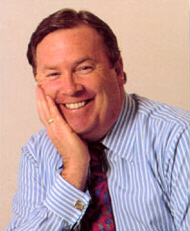
|
A successful businessman, he had never thought of himself as an author, and took an unusual route to the publication of his first book. A Trustee of Trinity College, Fox was asked to speak at a dinner for scholarship winners. In preparation for the speech, he prepared a handout based on his years of experience in the corporate world. Wanting to pass on the advice that he had learned, Jeff passed out the manuscript to the students after his speech and thought no more about it. But the students found his advice so compelling, that they had been making copies of it and passing it out to their friends. Eventually, one copy found its way into the hands of a well-known book packager in San Francisco, who gave Jeffrey a call and told him that he should get an agent and get the book published. Jeffrey signed with literary agent and former Prentice-Hall editor Doris Michaels of New York, who quickly negotiated a two-book deal with Hyperion, which was followed by a three-book deal. Jeffrey's first book, How to Become CEO: The Rules for Rising to the Top of Any Organization became a New York Times, Wall Street Journal and Business Week bestseller. It was followed by the bestsellers How to Become a Rainmaker: The Rules for Getting and Keeping Customers and Clients (Hyperion), Don't Send a Resume: And Other Contrarian Rules to Help Land a Great Job (Hyperion), and his latest release, How to Become a Great Boss: The Rules for Getting and Keeping the Best Employees (Hyperion).
His latest book is incredibly timely, given the rash of corporate accounting scandals and the public's fury at some corporate leaders who have displayed a shocking lack of ethics. In How to Become a Great Boss, Fox not only tells executives how to hire and keep the best people, but he also gives ethical guidance on how to run a responsible organization. Written in his trademark concise and humorous style, the book contains such chapter headings as "The Seamstress's Son," in which he warns CEOs about the dangers of forgetting their principles in the pursuit of the almighty dollar. He says, "Have principles. Live them. Teach them. Keep them. Your associates want a boss with solid principles, even if the associates don't always agree with the boss. Solid principles are to a boss as a compass is to a sailor." Chapter 41 is entitled, "Mirror, Mirror on the Wall, Who's the One to Take the Fall?" and gives some straight from the shoulder advice to corporate CEOs about taking personal responsibility for what happens in the company.
His books are currently published in sixty-seven foreign languages, including Chinese, Thai, French, German, Japanese, Russian and even Czechoslovakian. He is the only American business author to have had two consecutive #1 bestsellers in France. With a clear, concise delivery style and a contrarian approach to the standard business advice (such as telling job seekers that sending out resumes is a waste of time), Fox's books have universal appeal.
When he's not traveling on business or working on his next book (this one will address marketing), you can find Jeffrey at home with his wife in New Hampshire, whipping up a gourmet dinner, rooting for the New York Yankees or reading the latest Nelson DeMille novel. He spoke with us about his new book and how he founded his successful management company. He also gives some great advice for both bosses and job seekers.
What did you like to read when you were growing up?
I read widely and eclectically while growing up. The first real book I read was Black Beauty, which I read in the third grade. I read hundreds of books; I especially enjoyed Albert Payson Terhune's books, biographies of business leaders, and the Ripley's Believe It or Not novels. I was a member of a book club (Doubleday, I think) when in high school.
What was your first job in corporate America after college? What was the most important thing you learned from your first job?
After college I went to The Harvard Business School. After getting my graduate degree, I went to work for Heublein, a consumer products company that sold spirits, wines and specialty foods. I started as a "management trainee" in the marketing department and was promoted six times in five years.
I learned that good people, when motivated, can accomplish great things. However, it is a constant job to motivate people.
I'd like to talk about your latest book, How to Be A Great Boss. How did this project come about?
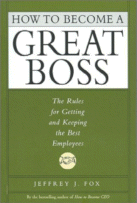
|
You had input from some pretty heavy-hitting CEOs. How did you approach the research necessary for this book?
I asked good bosses that I know to give me a boss lesson they use today, that they, in turn, had learned from a prior boss, parent, mentor, coach. The quid pro quo was that, if they agreed, I would list their names in a contributors section, and list their prior bosses. There are some anonymous contributors. In addition, none of the chapters mention a contributor by name ... lots of contributors learned big lessons from mistakes.
What are the top three mistakes that CEOs make when hiring a new employee?
(1) They hire too fast. They buckle in to the screaming needs of the organization, to pressures from above, or from customers, and they hire "good enough". "Good enough" is never good enough.
(2) They hire a safe profile. They do not hire the genius maverick, or the shake-it-up person, if that person doesn't fit their preconceived mold or profile.
(3) They don't listen to their inner instinct that is whispering, "forget the resume, forget the great interview, this ain't the guy."
During the 90s, attire in the workplace became increasingly more casual. Even the big law and accounting firms instituted "casual Fridays." Yet recent articles seem to indicate that this trend may be ending, with casual day being casually dropped at many companies. What is your advice to the upwardly mobile executive as to dress and appearance in the workplace? What about freelancers or telecommuters; how should they dress when they do appear at the office or on a video-conference?
| "Work hard to get a job. It is hard work. Never give up. Don't despair. There is an organization that needs the job seeker." |
Having to terminate an employee is one of the most difficult jobs that a CEO must do, especially in light of the current legal climate with claims of discrimination or unfair termination being common. In your book you advise CEOs to "Hire Slow and Fire Fast." What should a savvy CEO keep in mind when faced with a termination situation?
The savvy boss, when terminating, should obey the laws and protocols of state and company. Bosses should treat the terminated employee as they would treat themselves -- even if the employee is fired for cause. The termination should be fair, firm and fast. Get it over, and get on with business.
What led up to the founding of your consulting company, Fox and Company?
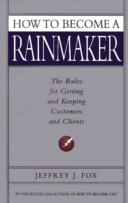
|
What has been the greatest challenge you've faced in running your own company?
In the consulting business, we do not have a product that sells while we sleep. The challenge is to sell an engagement, which if done well, unsells, or ends, that engagement. That specific client engagement. Getting business is a never-ending task.
Why and when should a corporation hire Fox and Company?
Organizations should hire Fox and Co. because we are the only firm in the world that knows how to translate our clients' product claims (e.g.; "safest," "most reliable," "longer life," "best deal," "superior quality," and on and on) into dollars and cents. We can dollarize any benefit or point-of-difference for any product or service our clients sell. If a client sells a bearing that reduces the noise of an engine, we can dollarize the value of the noise reduction. The value of the noise reduction. This is a big idea, and immensely valuable to clients.
Despite some officials' claims that we are in an economic recovery, the media and publishing industries are still in a slump, with declining ad revenues and massive layoffs still being the norm. In light of the high unemployment figures and the lingering recession, what three things can a recent college graduate do to improve his chances of finding a job? What about the laid-off middle manager or editor at a publishing house? What can she do to make herself more marketable?
| "Being 'creative' is not an excuse for not delivering economic value. Companies hire people, invest in people, to get a positive return on that investment." |
(2) The recent college graduate, and the folks in publishing, should look at opportunities in any industry. Don't lock into one industry, especially if that industry is soft. Skills are much more marketable then people think.
(3) Work hard to get a job. It is hard work. Never give up. Don't despair. There is an organization that needs the job seeker.
In the publishing and media worlds, bosses deal with a lot of non-corporate type employees: artists, publicists, designers, novelists etc., which makes for friction when artistic concerns bump up against the "bottom line" mentality of the corporate world. What can the smart aspiring author or artist do to further her career with a conservative large media or publishing firm?
Do things that ring the cash register. Being "creative" is not an excuse for not delivering economic value. Companies hire people, invest in people, to get a positive return on that investment. If one has ideas that will create business, some will invest in those ideas.
What can a great (but non-artistic type) boss do to handle his creative staff better?
Listen to them. Carefully explain the "what" and the "why" of the task or job. Leave the "how" up to the people. Remove barriers that hinder the "how." Be certain the creative employee understands the desired outcome.
You have a unique way of looking at the corporate world; you seem to see through the Emperor's New Clothes, so to speak. When did you first realize that you had a different slant on things?
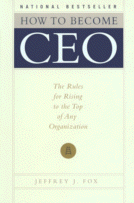
|
"Dollarization" is something that you talk about a lot in your book, How to Become a Rainmaker. What is dollarization, and why should potential rainmakers care about it? Why should great bosses care about dollarization?
Dollarization is the way to quantify the value of a product or service. Business lingo is full of value clichés: value added, value proposition, value selling, value transfer. But those clichés are all valueless, empty, just buzzwords without dollarization. Dollarization shows how a $12 lock actually costs $9.80 because it saves the customer $2.20 in reduced vandalism. Rainmakers need to have this skill, because people don't buy products, they buy what they get from the products. They don't buy a gasket; they buy no leaks. And what people get from a product can always be dollarized, if the product solves a problem. People buy value, an economic return. So Rainmakers don't sell gaskets, they sell money. Dollarization calculates how much money.
Great bosses need to dollerize the value of their products so they can price them to value (not to cost); so they can position the products for the right market segment; so they can advertise the product properly; so they can train salespeople to overcome the price objection.
In How to Become a Rainmaker, you talk about how to conduct an in-person sales call. But what does the Rainmaker do who deals with clients who only want to communicate via voicemail and email? Any tips?
Preplan, prepare and practice at voice-mails and emails with infinite care; with the benefits to the customer in mind; and always answering the question, "why should this customer do business with me." (My bias: too many emails are sloppy, slash-dash, and written with not enough care.)
I'd like to talk about the actual writing process for you. Would you take us through a typical writing day for you?
I don't have a typical writing day. I don't do research for my books. I write notes to myself, usually chapter titles that express my idea. After I get so overwhelmed with delay and procrastination I binge write for three or four hours for three or four days. I will write on a long plane ride ... if I have a good seat. I will write something as I lunch alone. Basically, I torment myself by not writing, until I force myself to start. Once I start writing, I write, and sometimes I write three or four chapters at the same time, switching among them. Not good.
I write in long hand, like Mark Twain (what a conceited thing to say!). Of course, if Mark Twain were alive he would use a computer, and I, alas, would be still a pen and paper dinosaur.
Have you ever had a secret hankering to write fiction?
I have mentally toyed with the idea of writing fiction, but do not think I have the skills, the ideas, the patience, the time, or the imagination. I am in awe of real writers like Stephen King, Lehane, Baldacci, Demille, Faulkner, Hemingway. I wanted to be a major league baseball player, and would have been one, if I could only hit, throw and field like a major leaguer. I always wanted to be a rock star but I can't sing, dance, or play a musical instrument (but I've got all the rest!).
So I would write fiction if I could come up with a great story, knew how to plot, could develop characters, do dialogue, but I can't ... right now.
When you're not working, what do you like to do to for fun?
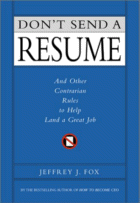
|
Is there anyone or anything in particular that has had a strong influence on your writing?
I think my writing has been most influenced by:
(1) David Ogilvy, renowned founder of the advertising firm Ogilvy and Mathers
(2) WAC -- Written Analysis of a Case -- a course taught in first year at Harvard Business School
(3) My previous stuff. For example, I just re-read, Strunk and White's lesson, "omit all needless words." I am pretty good at that because I like to get to the point, and travel light.
Return to the July 2002 issue of The IWJ.
More from Writers Write
